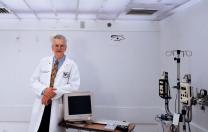The National Sleep Foundation’s 2005 survey found that 75 percent of American adults experience symptoms of a sleep problem at least a few nights per week. Sleep clinics like Sleep Health Centers, a for-profit enterprise whose medical director, David P. White, supervises six sites with 32 beds in the Boston area, investigate many of the 84 types of sleep disorder that clinicians have identified. White, McGinness professor of sleep medicine, who directs the sleep disorders program at Brigham and Women’s Hospital, explains that there are three main categories of sleep disorder: insomnias; disorders that make patients sleepy during the day, like narcolepsy or sleep apnea; and parasomnias, which include sleepwalking, sleep-talking, and REM behavior disorder.
Chronic insomnia may affect 10 percent of the population, but some Gallup polls indicate that as many as 40 percent have trouble sleeping on two or three nights per week. “Depression and anxiety states are the biggest cause of insomnia,” White says. Besides treating the underlying problems and practicing good “sleep hygiene” (e.g., going to bed at a regular time, having no clock in the bedroom), one intervention is, paradoxically, sleep restriction. “A lot of insomniacs spend more and more time in bedup to 14 hours a day. That’s counterproductive,” White says. “So you restrict them to the amount of time they can sleep: perhaps from 11 p.m. until 3 a.m. Get them to sleep well during that time and then build up from there.”
|
In narcolepsy, which affects one in 2,000 people, components of REM sleepbeing asleep, having muscular paralysis or weakness, and dreamingaffect people during waking hours. Research on narcoleptic Doberman dogs and genetically altered mice showed that animals unable to produce a protein called hypocretin were narcoleptic. The spinal fluid of humans who suffer from narcolepsy contains little or no hypocretin; hence treatment of narcolepsy may involve ways to enhance its production or replace it.
The most common problem that sleep clinics see is obstructive sleep apnea. “We’re seeing an epidemic of sleep apnea,” says Charles Czeisler, Baldino professor of sleep medicine. “It’s related to overweight, and is especially prevalent in certain regions.” Older, obese men are at higher risk. Sleep apnea affects individuals who may have a narrower passage of the upper throat; during sleep, muscles around this passage relax and close the passage partially or completely, stopping the flow of air into the lungs. This results in loud snoring, labored breathing, and even the cessation of breathing (apnea) for periods of more than 10 seconds. “It’s important to breathe in the right amounts of oxygen and breathe out carbon dioxide, to keep the levels right,” explains White, who trained in pulmonary medicine. “The mechanisms that control this don’t work as well during sleep.” Losing weight can help; in severe cases, sufferers may sleep wearing a special “continuous positive airway pressure” mask that keeps the passage open.
Parasomnias are a less common form of sleep disorder. In sleepwalking, something rouses the sleeper from deep (stage 3 or 4) sleep, and in a state somewhere between deep sleep and wakefulness, he or she can walk about or even drive a car for a period of 10 to 15 minutes. REM behavior disorder, which can be associated with degenerative brain disease, may last only seconds, but can be dangerous. “In REM sleep, all skeletal muscles are paralyzed, so that you can’t act out your dreams,” White explains. “But with REM behavior disorder, people can move.”







